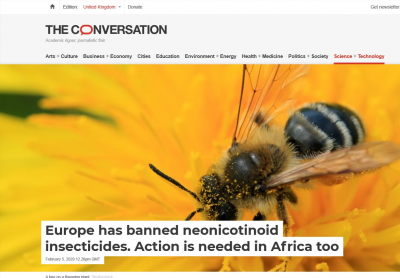


The Conversation published an article about 'Neonicotinoid Insecticides: Use and Effects in African Agriculture'.
The Conversation is an independent source of news and views, sourced from the academic and research community and delivered direct to the public, and the authors of the article are Peter McGrath, Coordinator of the InterAcademy Partnership, Michael Norton, Director of the European Academies’ Science Advisory Council’s Environment Programme, and Nina Hobbhahn, a Researcher specializing in Ecology at the European Academies’ Science Advisory Council.
These are the first paragraphs of the article:
First marketed in the late 1990s, neonicotinoid insecticides have become the world’s most widely used group of insecticides. They offer lower toxicity to mammals than the insecticides they replaced. But their systemic nature means that all parts of the plant become toxic to insect pests. Even just a coating around seeds offers weeks of protection to a growing crop.
This is great for farmers. But the characteristics that make them so effective have also wreaked enormous collateral damage. Neonics (as they are more familiarly called) are now the most notorious group of insecticides in the world.
Neonics are water soluble and non-selective. This means that they can contaminate the environment, causing collateral damage to non-target organisms. Studies have found that, when neonics are used as seed dressings, up to 95% of the active ingredient doesn’t enter the plant. It washes away, contaminating the soil and plants growing in neighbouring fields, and leaches into water bodies, where aquatic insects are exposed to it.
On top of this, the active ingredient also spreads into pollen and nectar, where pollinating insects such as bees, hoverflies and butterflies can ingest the neonics. Seven years ago, the harmful effects of neonics on honeybees raised the insecticides’s profile and led to an initial partial ban in the EU.